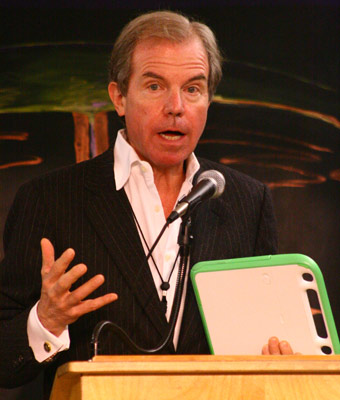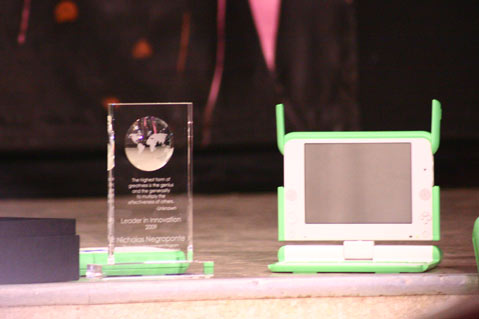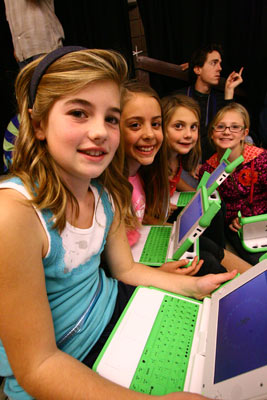Tech Mogul Brings Laptops to Kellogg Kids
UCSB and Nonprofit Link Goleta School with Children Worldwide

D.J. Perry’s third-grade class at Kellogg Elementary School in Goleta buzzed with excitement on Friday, December 5, as students clicked away on their new XO-brand laptops. The textbook-sized computers were provided to the school by UCSB’s Technology Management Program and its new partnership with One Laptop Per Child (OLPC) a Massachusetts-based nonprofit that aims for education through technology for the world’s poorest children.
This is the first collaboration between a Santa Barbara County school and OLPC, which initially focused its efforts on getting its specialized laptops to developing countries. Perry’s class can now not only communicate with other classrooms across the globe using wireless Internet, but also can connect with each other through a network that links each laptop-without Internet access. As part of the world-spanning program, the students have paired with a laptop-equipped Kenyan school.

Engineering professor Susannah Scott and Bill Grant, manager for the Technology Management Program-who are married and have two children at Kellogg-founded the Santa Barbara OLPC chapter along with some UCSB students and sought out the school as a regional partner. “I would really like to see this become an ongoing activity so the students can interact with kids from Kenya this semester, then kids from Peru next, and then kids from Afghanistan,” Scott remarked as she watched the kids familiarize themselves with the laptops.
After the students were presented with the computers, an award ceremony honored Nicholas Negroponte, OLPC founder and creator of the inexpensive XO laptop, with UCSB’s Leader in Innovation Award. In the 1980s, Negroponte was one of the founders of Massachusetts Institute of Technology’s Media Lab, an innovator in the way humans experience technology, from electronic music to “smart” prostheses. Also a founder of Wired magazine, Negroponte is a well-known “angel” having helped found more than 40 startups. Gary Hansen, dean of UCSB’s Technology Management Program, presented the award to Negroponte, stating, “He has led a life of creating and disseminating technology.”

Just as its creator is no ordinary guy, the XO laptop is no ordinary computer. Lighter than a lunchbox and designed to take a beating, the computer uses minimal energy and easily adapts to different cultures and languages; the laptops were created with children from diverse backgrounds in mind. Negroponte emphasized the computers’ durability, saying that 49 times out of 50 they don’t break when he throws them across a room to demonstrate their strength. (He refrained from doing so in the auditorium, however.) The demand for such computers is growing, with sales expected to increase to 50 million by the year 2012, according to Gartner Inc., a Connecticut-based tech research company.
Negroponte offered some explanation for OLPC’s mission. “There are 1.2 billion children in the kindergarten-through-sixth grade age range across the globe. Of those, half have no electricity at home or at school, [and] 100 million of those aren’t even able to go to school.” He went on to say that rather than wait for a government’s educational funds to trickle down to the poorest nations, he and his think tank instead examined how to aid the children directly. This goal would seem to be catching on. Peru has recently committed to distribute a million laptops to remote villages, while Uruguay has pledged to provide every single child with a laptop, and Rwanda has promised to rapidly integrate the laptops into its schools. “Countries are really getting it, and it’s completely changing education there,” Negroponte said.
When asked how he responds to the criticism he often hears of laptops being an exorbitant luxury when children in remote areas don’t have adequate shelter, nutrition, or medical care, Negroponte responded, “Substitute the word education for laptop : If you think of it as an accessory it doesn’t seem as important. Instead you have to think of it as school in a box.”
Grant explained the motivation for bringing the program to area schools: “I see OLPC as a portal to engage young people,” he said. “I don’t have to go to Bolivia to find kids who need to participate more in our society.” Scott, meanwhile, concluded the awards ceremony by summing up how the program envisions its role in fostering educational opportunity. “I think kids will be who change the world, and our job is to tell them they can,” she said.



